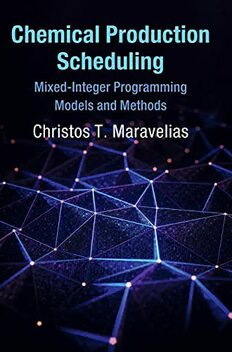Table Of ContentChemical Production Scheduling
Understand common scheduling as well as other advanced operational problems with
this valuable reference from a recognized leader in the field. Beginning with basic
principles and an overview of linear and mixed-integer programming, this unified
treatment introduces the fundamental ideas underpinning most modeling approaches,
andwillallowyoutoeasilydevelopyourownmodels.Withmorethan150figures,the
basic concepts and ideas behind the development of different approaches are clearly
illustrated. The book addresses a wide range of problems arising in diverse industrial
sectors, from oil and gas to fine chemicals, and from commodity chemicals to food
manufacturing. A perfect resource for engineering and computer science students,
researchers working in thearea, and industrial practitioners.
ChristosT.MaraveliasistheAndersonFamilyProfessorinEnergyandtheEnvironment
and Professorof Chemical and Biological Engineeringat PrincetonUniversity.
Cambridge Series in Chemical Engineering
SERIESEDITOR
ArvindVarma, Purdue University
EDITORIALBOARD
Juan de Pablo, University of Chicago
Michael Doherty, University of California-SantaBarbara
Ignacio Grossmann, Carnegie Mellon University
Jim Yang Lee, NationalUniversity of Singapore
Antonios Mikos, Rice University
BOOKSINTHESERIES
BaldeaandDaoutidis,DynamicsandNonlinearControlofIntegratedProcessSystems
Chamberlin,RadioactiveAerosols
Chau,ProcessControl:AFirstCoursewithMatlab
Cussler,Diffusion:MassTransferinFluidSystems,ThirdEdition
CusslerandMoggridge,ChemicalProductDesign,SecondEdition
DePabloandSchieber,MolecularEngineeringThermodynamics
Deen,IntroductiontoChemicalEngineeringFluidMechanics
Denn,ChemicalEngineering:AnIntroduction
Denn,PolymerMeltProcessing:FoundationsinFluidMechanicsandHeatTransfer
DorfmanandDaoutidis,NumericalMethodswithChemicalEngineeringApplications
DuncanandReimer,ChemicalEngineeringDesignandAnalysis:AnIntroduction2E
Fan,ChemicalLoopingPartialOxidationGasification,Reforming,andChemicalSyntheses
FanandZhu,PrinciplesofGas-SolidFlows
Fox,ComputationalModelsforTurbulentReactingFlows
Franses,ThermodynamicswithChemicalEngineeringApplications
Grossmann,AdvancedOptimizationforProcessSystemsEngineering
Leal,AdvancedTransportPhenomena:FluidMechanicsandConvectiveTransportProcesses
LimandShin,Fed-BatchCultures:PrinciplesandApplicationsofSemi-BatchBioreactors
Litster,DesignandProcessingofParticulateProducts
Maravelias,ChemicalProductionScheduling
MarchisioandFox,ComputationalModelsforPolydisperseParticulateandMultiphaseSystems
MewisandWagner,ColloidalSuspensionRheology
Morbidelli,Gavriilidis,andVarma,CatalystDesign:OptimalDistributionofCatalystinPellets,
Reactors,andMembranes
Nicoud,ChromatographicProcesses
NobleandTerry,PrinciplesofChemicalSeparationswithEnvironmentalApplications
OrbeyandSandler,ModelingVapor-LiquidEquilibria:CubicEquationsofStateandTheirMixingRules
Petyluk,DistillationTheoryandItsApplicationstoOptimalDesignofSeparationUnits
Pfister,Nicoud,andMorbidelli,ContinuousBiopharmaceuticalProcesses:Chromatography,
Bioconjugation,andProteinStability
RamkrishnaandSong,CyberneticModelingforBioreactionEngineering
RaoandNott,AnIntroductiontoGranularFlow
Russell,Robinson,andWagner,MassandHeatTransfer:AnalysisofMassContactorsandHeat
Exchangers
Schobert,ChemistryofFossilFuelsandBiofuels
Shell,ThermodynamicsandStatisticalMechanics
Sirkar,SeparationofMolecules,MacromoleculesandParticles:Principles,PhenomenaandProcesses
Slattery,AdvancedTransportPhenomena
Varma,Morbidelli,andWu,ParametricSensitivityinChemicalSystems
Vassiliadisetal.,OptimizationforChemicalandBiochemicalEngineering
Weatherley,IntensificationofLiquid–LiquidProcesses
Wolf,Bielser,andMorbidelli,PerfusionCellCultureProcessesforBiopharmaceuticals
Zhu,Fan,andYu,DynamicsofMultiphaseFlows
Chemical Production Scheduling
Mixed-Integer Programming Models and Methods
CHRISTOS T. MARAVELIAS
PrincetonUniversity
UniversityPrintingHouse,CambridgeCB28BS,UnitedKingdom
OneLibertyPlaza,20thFloor,NewYork,NY10006,USA
477WilliamstownRoad,PortMelbourne,VIC3207,Australia
314–321,3rdFloor,Plot3,SplendorForum,JasolaDistrictCentre,NewDelhi–110025,India
79AnsonRoad,#06–04/06,Singapore079906
CambridgeUniversityPressispartoftheUniversityofCambridge.
ItfurtherstheUniversity’smissionbydisseminatingknowledgeinthepursuitof
education,learning,andresearchatthehighestinternationallevelsofexcellence.
www.cambridge.org
Informationonthistitle:www.cambridge.org/9781107154759
DOI:10.1017/9781316650998
© ChristosT.Maravelias2021
Thispublicationisincopyright.Subjecttostatutoryexception
andtotheprovisionsofrelevantcollectivelicensingagreements,
noreproductionofanypartmaytakeplacewithoutthewritten
permissionofCambridgeUniversityPress.
Firstpublished2021
AcataloguerecordforthispublicationisavailablefromtheBritishLibrary.
LibraryofCongressCataloging-in-PublicationData
Names:Maravelias,ChristosT.,1973–author.
Title:Chemicalproductionscheduling/ChristosT.Maravelias,PrincetonUniversity.
Description:Firstedition.|Cambridge;NewYork,NY:CambridgeUniversityPress,[2020]|
Series:Cambridgeseriesinchemicalengineering|Includesbibliographicalreferencesandindex.
Identifiers:LCCN2020037674(print)|LCCN2020037675(ebook)|ISBN9781107154759(hardback)|
ISBN9781316650998(epub)
Subjects:LCSH:Chemicalplants–Management.|Chemicalengineering.|Productionscheduling.
Classification:LCCTP155.6.M372020 (print)|LCCTP155.6 (ebook)|DDC660–dc23
LCrecordavailableathttps://lccn.loc.gov/2020037674
LCebookrecordavailableathttps://lccn.loc.gov/2020037675
ISBN978-1-107-15475-9Hardback
CambridgeUniversityPresshasnoresponsibilityforthepersistenceoraccuracy
ofURLsforexternalorthird-partyinternetwebsitesreferredtointhispublication
anddoesnotguaranteethatanycontentonsuchwebsitesis,orwillremain,
accurateorappropriate.
To the memory of my father.
Contents
Preface page xvii
Part I : Background
1 Introduction 3
1.1 Preliminaries 3
1.1.1 Scheduling: Applications andDefinition 3
1.1.2 SomeSimpleProblems 4
1.1.3 Scheduling inthe Supply Chain 5
1.1.4 Interactions with Other Planning Functions 6
1.1.5 Scheduling inthe Process Industries 8
1.1.6 General Problem Statement 9
1.2 Chemical Production Environments 10
1.2.1 Discrete Manufacturing MachineEnvironments 10
1.2.2 Critical Insights 13
1.2.3 Sequential Environments 17
1.2.4 Network Environments 20
1.2.5 General Environments 21
1.3 Classes ofProblems 22
1.3.1 Production Environments (α) 22
1.3.2 Processing Restrictionsand Features (β) 23
1.3.3 Objective Functions(γ) 24
1.3.4 Problem Classification 25
1.4 Approaches to Scheduling 26
1.4.1 Problem-Specific Algorithms 26
1.4.2 Metaheuristics 26
1.4.3 Integrated Modeling/Solution Approaches 26
1.4.4 Mathematical Programming 26
1.4.5 HybridMethods 27
1.5 Scheduling MIPModel Classification 27
1.6 BookOutline 29
1.7 Notes and FurtherReading 30

